
Don’t believe common myths about easing arthritis pain
Nearly one-quarter of all U.S. adults have arthritis. But many myths persist about the best ways to ease arthritis pain.
“Most people believe one or more misconceptions about what causes arthritis or what helps to reduce arthritis pain,” said Hani Habal, MD, a rheumatologist with OSF Medical Group.
Distinguishing between myth and fact when it comes to arthritis can go a long way toward helping people manage arthritis pain. Here are some common myths and facts to dispel them.
Myth: Acetaminophen (Tylenol) is not a good treatment for arthritis pain.
Fact: When taken correctly, acetaminophen is a safe and effective pain reliever for many people with arthritis pain.
By contrast, NSAIDs such as ibuprofen (Advil and Motrin) can have serious blood pressure and kidney health risks if taken for too long.
“Acetaminophen is a safe and effective way to ease arthritis pain, even taken over long periods,” Dr. Habal said. “Taking acetaminophen regularly, instead of just when experiencing symptoms, is especially beneficial.”
Other medical options include topical creams, either over the counter or prescription. These can work well and have fewer side effects than oral medications, Dr. Habal said.
Myth: Wearing a brace or splint 24 hours a day on an uncomfortable joint, such as the elbow, will help improve symptoms.
Fact: Wearing a brace or splint for too long can immobilize the joints and muscles, a no-no for arthritic joints. Exercise and movement are the best “medicine” for arthritis pain, Dr. Habal said.
“With arthritis, the expression ‘use it or lose it’ is appropriate. People should stay active and can see a physical therapist or another provider for help with mobility and strength.”
Myth: Vaccines cause arthritis.
Fact: There is no evidence that vaccines cause arthritis pain.
“People can experience temporary aches as a side effect or immune response to vaccinations, but this is not arthritis and resolves in a short time,” Dr. Habal said.
Myth: Only surgery can relieve arthritis pain.

Fact: The first options for arthritis pain are the many non-invasive ways to treat pain: exercise, diet, supplements and medications. While surgery can be a recourse in severe cases, non-invasive management of arthritis is preferable.
“Most people do not need surgery for arthritis,” Dr. Habal said. “Exercise, a healthy diet and managing stress can go a long way to keeping pain away.”
Myth: Vitamins and supplements can’t help arthritis pain.
Fact: There are several supplements that are good for general health that can help with arthritis.
- “Vitamin D strengthens the immune system and reduces inflammation,” Dr. Habal said. “Most people are vitamin D deficient and can benefit from taking a supplement.” He recommends that most people with arthritis take a maintenance dose of vitamin D over the counter, of 1,000 or 2,000 international units (IU) every day.
- Omega-3 fatty acids, one of the “good fats,” can be added either in food such as salmon or avocado or in supplement form.
- Turmeric has been shown to ease arthritis pain. The spice can be added to food or taken as a supplement.
Myth: Young people can’t get arthritis.
Fact: Arthritis is not only a disease of old age or injury.
“Young people are diagnosed with rheumatoid arthritis and can experience severe symptoms,” said Dr. Habal.
Myth: The foods you eat have no impact on arthritis.
Fact: A healthy diet, such as the Mediterranean diet — rich in vegetables, fruits and whole foods — can reduce inflammation and pain.
“Processed foods and fried foods increase inflammation, which can magnify pain,” Dr. Habal said. “People should avoid those foods.”
He also said that losing even a modest amount of weight can decrease pain and improve other arthritis symptoms. A healthy diet — including appropriate portion sizes — can help people lose weight, one of the top ways to decrease the load on joints.
“This is especially important now as many people have gained weight due to the pandemic,” Dr. Habal said.
Myth: Fibromyalgia is arthritis.
Fact: While the pain can be similar, fibromyalgia attacks your nervous system, while arthritis attacks your joints.
Other ways to minimize arthritis
Controlling stress can be a critical component of reducing pain from autoimmune arthritis in particular, as well as pain from fibromyalgia.
“Stress greatly affects the immune system,” Dr. Habal said. Learning skills to cope with stress can minimize its effect on health, especially pain.
The first step in managing arthritis pain and symptoms is a visit to your primary care provider. Your provider can learn more about your health history, examine you and order tests (such as blood tests) to determine the type and severity of arthritis.
You may also be referred to a provider who specializes in arthritis, such as a rheumatologist. The provider can perform more specialized tests and imaging to get to the root causes and advise the best management tools.
